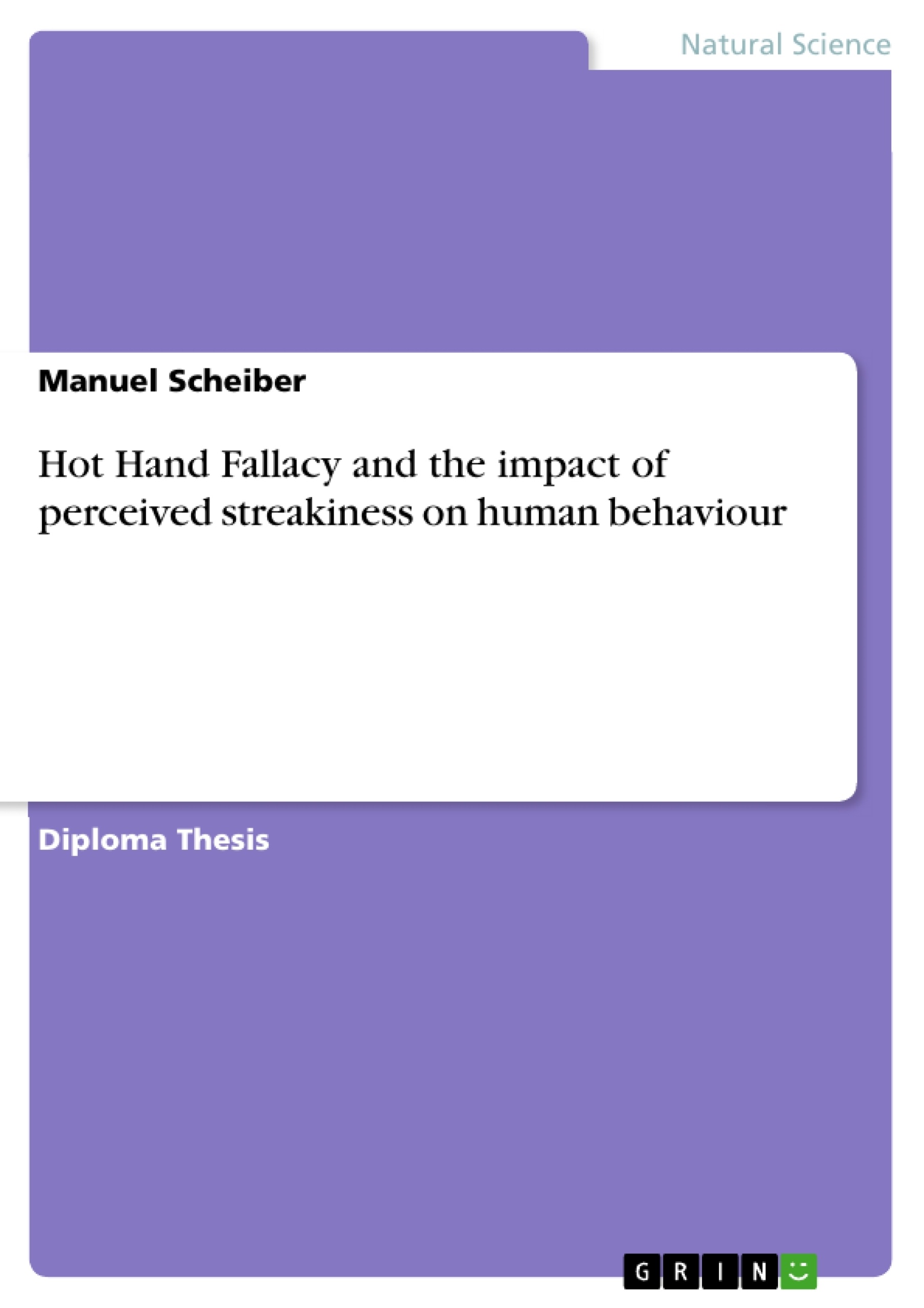The discussion about the existence of theHot Hand,a widespread belief that success breeds success, has been unsettled since it was initially mentioned in 1985. The authors of the study originally concluded that any observed streakiness was simply a misperception and that the sequences did not significantly differ from the outcome of a randomly generated process.
The reasons why the discussion became this extensive may only be assumed. One reason definitely is that the main application areas for theHot Handbelief are sports and the financial market, two areas that a vast number of people get in touch with. A large number of men and women at least occasionally watch sports on television or attend a live game. More and more people also get involved in actively managing their savings by a growing number of different financial instruments like shares and bonds.
Another reason for the amount of existing analyses and studies about topics related to theHot Handeffect is that arguments for and against theHot Handrange from statistical problems, e.g. which statistical test to apply, to deep psychological issues like the perception of random processes.
Knowing whether the believers in theHot Handor the sceptics are right is essential to everybody because in many everyday situations, people act according to which of the two groups they belong to. This is especially important in situations where money is at stake. Therefore, the aim of this paper is to answer the following research question: Is the belief in theHot Handeffect a fallacy and what is its impact on human behaviour in an economic environment as the betting market?
While a lot of research has been done in the search for the existence of theHot Hand,it has rarely been attempted to take into account a wide range of suggestions concerning the way of examination and inference from data, and to conduct an empirical study that satisfies most of the criticism. Thus, the analysis of data will be conducted in a way that avoids errors and uncertainties that have been encountered in more than 20 years of discussion about the Hot Hand effect.
The observations of gambling behaviour in the sports betting market shall indicate how a belief in theHot Handinfluences economic decisions. In the betting market, as well as in every other economic environment it is essential that decisions are made on a rational basis.
Table of Contents
- Introduction
- Motivation and basic background
- Methodology and organization
- The Hot Hand: A literature overview
- Introducing the Hot Hand
- Hot Hand and Gambler's Fallacy
- Streakiness in the financial market
- The Hot Hand effect in sports
- Theoretical Issues
- Problematic issues of Hot Hand research in sports
- More research regarding the Hot Hand in sports
- Empirical analysis of professional bowling data
- Basics of bowling
- Collection of data
- Analysis of professional bowlers' performance
- General analysis of bowling data
- Individual analysis of bowling data
- Analysis utilizing conventional tests
- The Hot Hand in the betting market
Objectives and Key Themes
This thesis examines the "Hot Hand" effect, a cognitive bias where individuals perceive a streak of success as a predictor of future success. The research explores the Hot Hand phenomenon in various contexts, including sports and financial markets, and analyzes its impact on human behavior.
- The "Hot Hand" effect as a cognitive bias
- The relationship between perceived streakiness and decision-making
- The impact of the Hot Hand effect in sports
- The influence of the Hot Hand effect in financial markets
- Empirical analysis of the Hot Hand effect in professional bowling
Chapter Summaries
- Introduction: This chapter introduces the concept of the Hot Hand effect and outlines the motivation and methodology of the research.
- The Hot Hand: A literature overview: This chapter explores the existing literature on the Hot Hand effect, examining its theoretical foundations and addressing its relationship with the Gambler's Fallacy. The chapter also examines the Hot Hand effect in different contexts, including the financial market and sports.
- Empirical analysis of professional bowling data: This chapter presents an empirical analysis of professional bowling data to examine the presence and impact of the Hot Hand effect in this specific sport. It analyzes the performance of professional bowlers and utilizes statistical tests to evaluate the validity of the Hot Hand hypothesis.
- The Hot Hand in the betting market: This chapter explores the role of the Hot Hand effect in the betting market and discusses its implications for betting strategies and market dynamics.
Keywords
The primary keywords and focus topics of this thesis are: Hot Hand effect, cognitive bias, streakiness, decision-making, sports, financial markets, empirical analysis, professional bowling, betting market.
Frequently Asked Questions
What is the "Hot Hand" effect?
The Hot Hand effect is a cognitive bias where people believe that a person who has experienced success has a greater chance of further success in additional attempts.
In which areas is the belief in the Hot Hand most prevalent?
It is most commonly observed in sports and the financial markets, where people look for patterns in performance or stock movements.
What specific sport is used for empirical analysis in this paper?
The paper presents an empirical analysis of professional bowling data to test for the existence of the Hot Hand effect.
How does the Hot Hand effect influence the betting market?
The belief in "streakiness" can lead to irrational economic decisions in the sports betting market, affecting how gamblers place their bets.
What is the relationship between the Hot Hand and the Gambler's Fallacy?
The paper explores how these two cognitive biases relate to the perception of random processes and decision-making.
- Quote paper
- Mag. Manuel Scheiber (Author), 2006, Hot Hand Fallacy and the impact of perceived streakiness on human behaviour, Munich, GRIN Verlag, https://www.grin.com/document/65247



